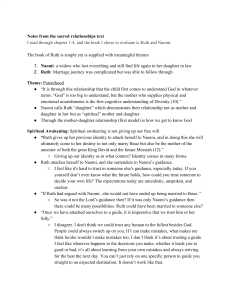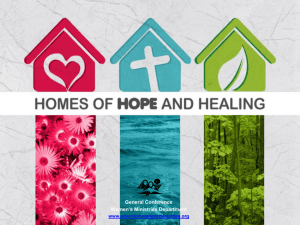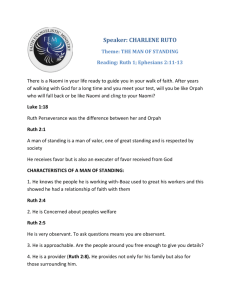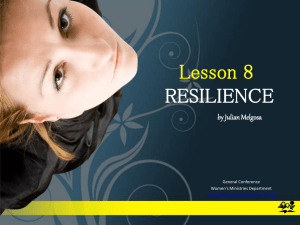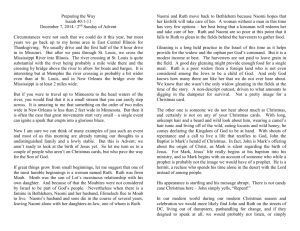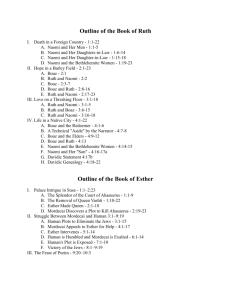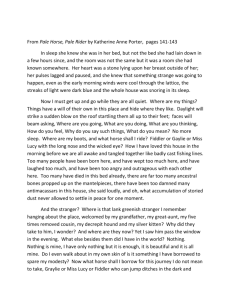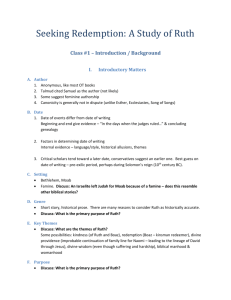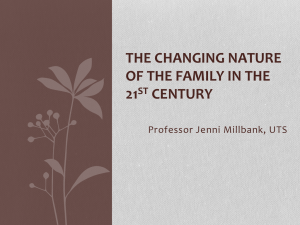- Our Lady`s Stowmarket
advertisement
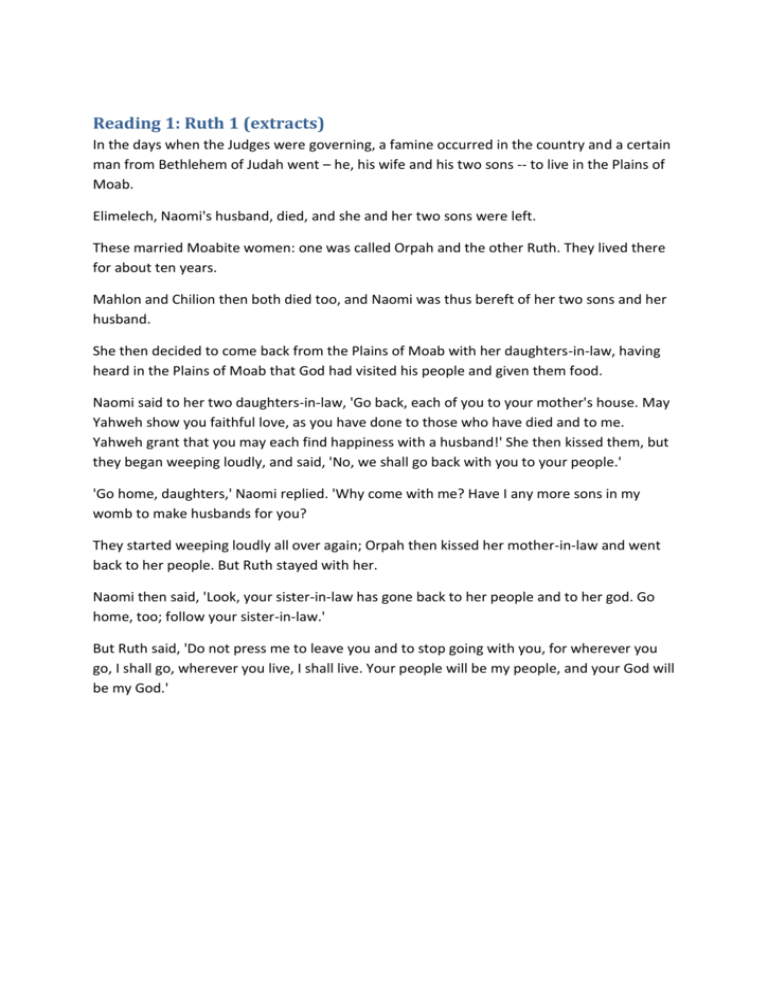
Reading 1: Ruth 1 (extracts) In the days when the Judges were governing, a famine occurred in the country and a certain man from Bethlehem of Judah went – he, his wife and his two sons -- to live in the Plains of Moab. Elimelech, Naomi's husband, died, and she and her two sons were left. These married Moabite women: one was called Orpah and the other Ruth. They lived there for about ten years. Mahlon and Chilion then both died too, and Naomi was thus bereft of her two sons and her husband. She then decided to come back from the Plains of Moab with her daughters-in-law, having heard in the Plains of Moab that God had visited his people and given them food. Naomi said to her two daughters-in-law, 'Go back, each of you to your mother's house. May Yahweh show you faithful love, as you have done to those who have died and to me. Yahweh grant that you may each find happiness with a husband!' She then kissed them, but they began weeping loudly, and said, 'No, we shall go back with you to your people.' 'Go home, daughters,' Naomi replied. 'Why come with me? Have I any more sons in my womb to make husbands for you? They started weeping loudly all over again; Orpah then kissed her mother-in-law and went back to her people. But Ruth stayed with her. Naomi then said, 'Look, your sister-in-law has gone back to her people and to her god. Go home, too; follow your sister-in-law.' But Ruth said, 'Do not press me to leave you and to stop going with you, for wherever you go, I shall go, wherever you live, I shall live. Your people will be my people, and your God will be my God.' Reading 2: From the Ipswich Celebration of Community, March 2001 In parts of the ancient world the stranger and fugitive were treated as honoured guests. The altar of a temple and the hearth of a home were places where people could claim absolute refuge and safety. It was believed to be a sacred duty to receive, lodge and protect the helpless stranger. Stories were told about the gods coming to earth to visit mankind and woe befall those who failed to give them hospitality. The same attitude prevailed in ancient Israel and among the Celtic peoples. The ancient Greek word for stranger also meant guest. The classical Latin for stranger “hospes” (from which we get hospitality) also meant host or guest. So we have in Europe a great tradition to follow. However, there was an alternative way of seeing strangers which has been handed on by the Romans and illustrated by Latin vocabulary – the stranger is the enemy, the one who is to be feared, marginalised, cast out and even to be destroyed. This is a more sinister tradition, one which seems to be prevailing in Britain today, as well as in other European states. It is an attitude which prepares the ground for holocaust. We are at a critical moment in history, a time when each local community and every individual must make a significant choice between two attitudes. Rabbi Hugo Gryn, who himself experienced but survived concentration camp, said “How we are with the stranger is an index of our spiritual and moral civilization; how we are with the one to whom we owe nothing except our common humanity, that is the grave test.” Reading 3: Open letter from Antoine Leiris, husband of one of the victims On Friday evening you stole the life of an exceptional person, the love of my life, the mother of my son, but you will not have my hatred. I don’t know who you are and I don’t want to know, you are dead souls. If this God for whom you kill blindly made us in his image, every bullet in the body of my wife is a wound in his heart. So no, I will not give you the satisfaction of hating you. You want it, but to respond to hatred with anger would be to give in to the same ignorance that made you what you are. You would like me to be scared, for me to look at my fellow citizens with a suspicious eye, for me to sacrifice my liberty for my security. You have lost. I saw her this morning. At last, after nights and days of waiting. She was as beautiful as when she left on Friday evening, as beautiful as when I fell head over heels in love with her more than 12 years ago. Of course I am devastated with grief, I grant you this small victory, but it will be short-lived. I know she will be with us every day and we will find each other in heaven with free souls which you will never have. Us two, my son and I, we will be stronger than every army in the world. He is only just 17 months old; he is going to eat his snack, just like every other day, then we are going to play like every other day and all his life this little boy will be happy and free. Because you will never have his hatred, either.
